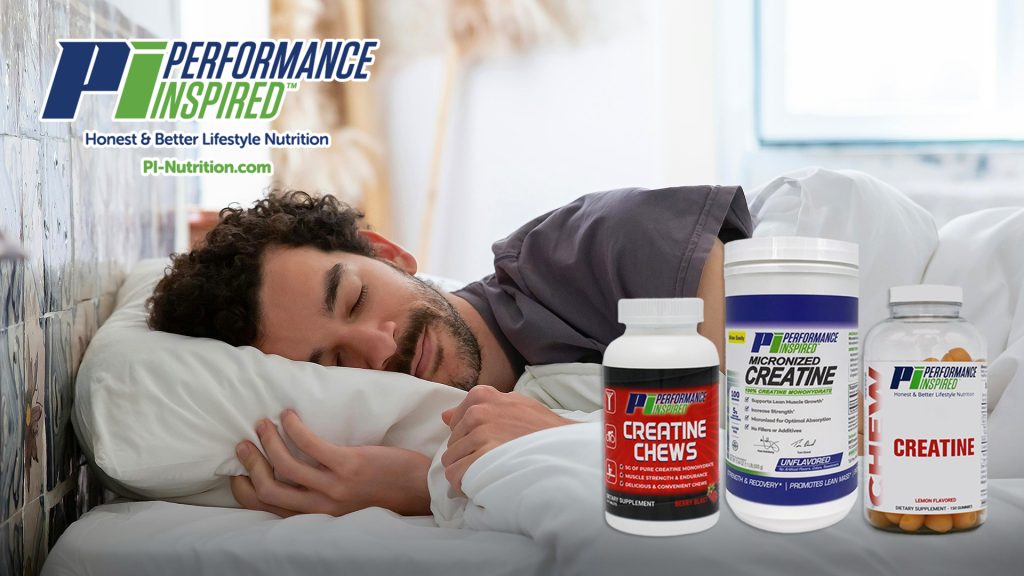Creatine and Sleep Deprivation: What You Should Know

Creatine has long been an important supplement for increasing muscle mass, endurance, and strength. In a past blog post, we highlighted ten things you should know about creatine. Check it out!
In addition to the benefits mentioned above and in the blog, recent research has found that creatine might actually help combat the effects of sleep deprivation. This is great news for those who work jobs that require them to be up and alert for an extended amount of time.
But first, let’s look at how our bodies get creatine and why we often need to supplement.
What is creatine?
Creatine is a compound derived from three amino acids. The Mayo Clinic explains that it’s “found mostly in your body’s muscles as well as in the brain.” Our bodies can only make about 1 gram a day, so we must get the rest of what we need from either food or supplements.
Foods that contain creatine include salmon, cod, pork, beef, and chicken. But vegetarians/vegans, people who don’t like or eat enough meat or fish, and body builders who want to increase muscle mass may need or want to supplement.
Studies show that our bodies need only 5 grams of creatine a day and that anything beyond that may not be able to be used in the long term. But recent research has found that larger doses for small amounts of time may actually help those who are sleep deprived.
If you are one of the millions of people suffering from sleep deprivation, you may have just found a way to help rejuvenate your body.
Recent research
A 2024 Scientific Reports article reported on the hypothesis that creatine can help reduce the negative effects often experienced by those who are sleep deprived. It found that “acute creatine was bio-available to the brain as suggested by increased tCr/tNAA [total creatine and total N-acetylaspartate] and reduced subjective fatigue compared to the placebo condition.” This is so because the “creatine alleviated changes in phosphates, pH levels and fading of cognitive performance evoked by [sleep deprivation].” It also found that subjects in the study scored higher on cognitive tests afterward.
According to Medical News Today, research showed that creatine might help in certain circumstances, including “in improving cognition among older adults, especially those with lower intake of animal-derived foods, as well as in cases of mild brain trauma and sleep deprivation.”
And an article published by NIH from Sports Medicine concurs, saying: “Creatine supplementation can increase brain creatine content, which over time may help explain some of the promising effects on measures of brain health and function. Specifically, creatine supplementation has been shown to improve measures of cognition and memory (primarily in aging adults) and decreases symptoms of sleep deprivation in human and animal populations.”
But how much does a person need to combat the effects of sleep deprivation?
An article in GQ explains that “while a daily dose of five grams has been well established as the ideal for improving muscular strength and size, the precise serving of creatine required to capitalize on the mental benefits is yet to be determined, although it’s likely considerably higher.” It goes on to state that in order for a person to feel these benefits, the creatine has to pass through the blood-brain barrier, which is much more difficult than the muscle tissue it normally has to pass through, so experts recommend between 10 and 25 grams a day, with this amount broken down into smaller doses throughout the day.
However, doctors do not recommend this high of a sustained use for longer than four to eight weeks and said that these amounts should be reserved for those who are truly sleep deprived. A doctor who spoke to GQ stated that he is a “firm believer” of the benefits of high doses of creatine when sleep deprived and said that he does so on days when he had not slept well the night before.
Science Direct stated that it “carried out a systematic review” of these studies, which “supported claims that creatine supplementation can increase brain creatine content but also demonstrated somewhat equivocal results for effects on cognition.” It said that the results so far are promising but called for further research.
PI Creatine
Creatine is one of the most well studied supplements out there, and it’s safe for most people. Though if you have kidney problems, other health concerns, or are taking other meds, talk with your doctor first before starting. But once you get that green light, check out PI’s creatine. We offer three forms because we know that you have varied needs.
Pure Micronized Creatine: This is an unflavored powder that you can mix with your favorite beverage. Each scoop has 5 grams of pure micronized creatine.
Creatine Monohydrate Gummies: Each serving of these delicious lemon-flavored gummies is 5 grams. You can easily take them with you wherever you go.
Creatine Chews: These berry-flavored chews contain 5 grams of pure creatine monohydrate. Like the gummies, you can take them with you anywhere.
If you’re one of the millions of people who suffer from sleep deprivation, talk to your doctor about supplementing with extra creatine during days when the sleep deprivation effects are at their worst. You may just find that you feel immensely better!

